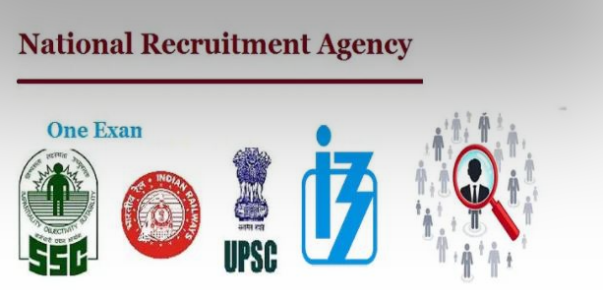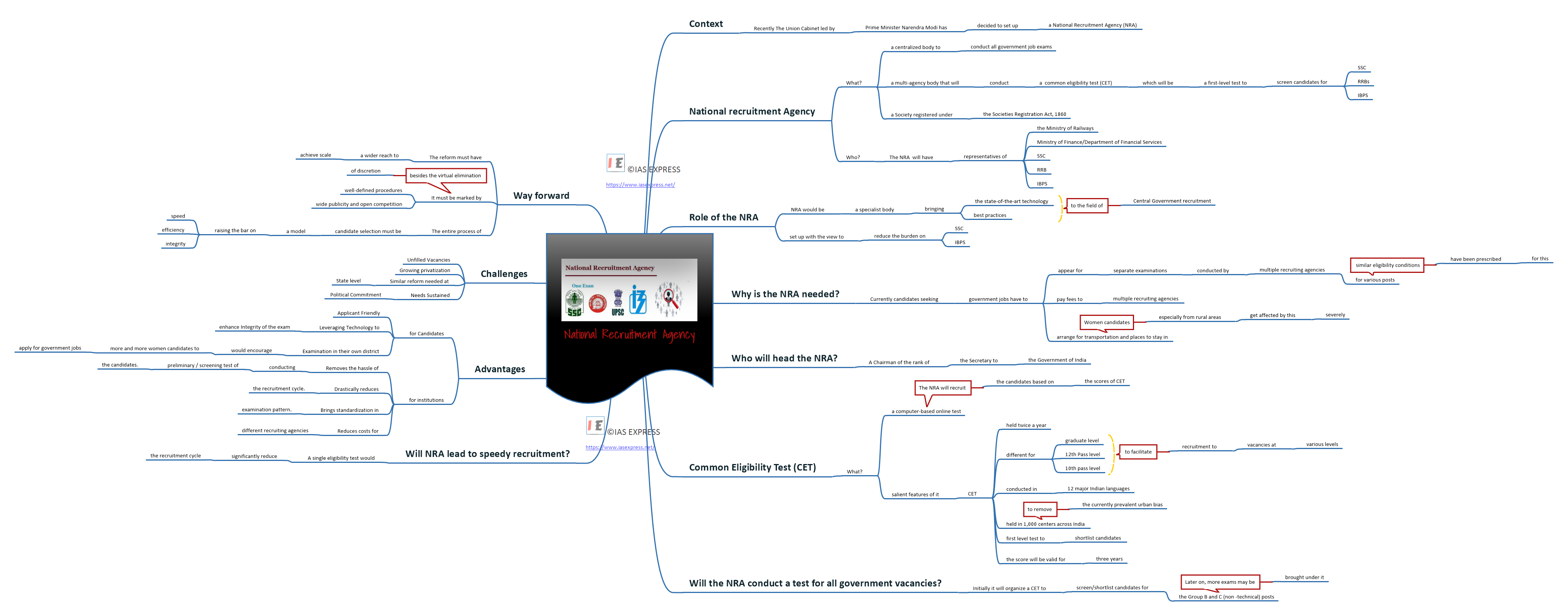National Recruitment Agency – Need, Advantages, Challenges, Way Forward

The Union Cabinet led by Prime Minister Narendra Modi has decided to set up a National Recruitment Agency (NRA) recently. The proposed NRA will conduct a common preliminary examination for various recruitments in the central government, paving the way for a transformational reform in the recruitment process for central government jobs. NRA will conduct an online Common Eligibility Test for shortlisting candidates for the majority of central government jobs twice a year. Based on the CET score a candidate can apply for a vacancy with the respective agency. It is in this context, let’s make an in-depth analysis of the proposed National Recruiting agency.
What is National recruitment Agency?
- It will be a centralized body to conduct all government job exams.
- It will be a multi-agency body that will conduct a common eligibility test (CET) which will be a first-level test to screen candidates for SSC, RRBs, & IBPS.
- It will be a Society registered under the Societies Registration Act, 1860.
- The NRA will have representatives of the Ministry of Railways, Ministry of Finance/Department of Financial Services, the SSC, RRB & IBPS.
What is the role of the NRA?
- It is intended that the NRA would be a specialist body, bringing the state-of-the-art technology and best practices to the field of Central Government recruitment.
- It is being set up with the view to reduce the burden on the Staff Selection Commission (SSC) and the Institute of Banking Personnel Selection (IBPS).
Why is the NRA needed?
- Currently, candidates seeking government jobs have to appear for separate examinations conducted by multiple recruiting agencies for various posts, for which similar eligibility conditions have been prescribed.
- Candidates have to pay fees to multiple recruiting agencies and also have to travel long distances for appearing in various exams.
- These multiple recruitment examinations are a burden on the candidates, as also on the respective recruitment agencies, involving avoidable/repetitive expenditure, law and order/security related issues and venue related problems.
- As the candidates have to arrange for transportation and places to stay in that are far away, They face constraints in appearing in multiple examinations. It is extremely visible in the case of Women candidates, especially from rural areas.
Who will head the NRA?
- The NRA will be headed by a Chairman of the rank of the Secretary to the Government of India.
What is mean by Common Eligibility Test (CET)?
- It is a computer-based online test.
- The NRA will recruit the candidates based on the scores of the Common Eligibility Test (CET)
What are the salient features of CET?
- The Common Eligibility Test will be held twice a year.
- There will be different CETs for graduate level, 12th Pass level and 10th pass level to facilitate recruitment to vacancies at various levels.
- These separate CET includes those non-technical posts to which recruitment is presently carried out by the Staff Selection Commission (SSC), the Railway Recruitment Boards (RRBs) and by the Institute of Banking Personnel Selection (IBPS).
- The CET will be conducted in 12 major Indian languages. This is a major change, as hitherto examinations for recruitment to Central Government jobs were held only in English and Hindi.
- To begin with, CET will cover recruitments made by three agencies: viz. Staff Selection Commission, Railway Recruitment Board and the Institute of Banking Personnel Selection. This will be expanded in a phased manner.
- CET will be held in 1,000 centres across India in a bid to remove the currently prevalent urban bias.
- There will be an examination centre in every district of the country.
- There will be a special thrust on creating examination infrastructure in the 117 aspirational districts.
- CET will be a first level test to shortlist candidates and the score will be valid for three years.
- There shall be no restriction on the number of attempts to be taken by a candidate to appear in the CET subject to the upper age limit.
- Age relaxation for SC/ST and OBC candidates as per existing rules will apply.
- CET would ease the burden of candidates who are at present required to prepare for each of the examinations separately as per the different syllabus.
Will the NRA conduct a test for all government vacancies?
- Initially, it will organize a CET to screen/shortlist candidates for the Group B and C (non -technical) posts, which are now being conducted by the Staff Selection Commission (SSC), Railways Recruitment Board (SSC) and Institute of Banking Personnel Selection (IBPS). Later on, more exams may be brought under it.
- As of now, UPSC conducts the recruitment examinations for Group A and Group B posts. These examinations do not come under the ambit of the NRA.
How much money will be spent on the NRA?
- Initially, the Union Cabinet has approved an amount of Rs 1517.57 crore for the NRA, for a period of 3 years.
- The money will be used for setting up of the NRA, and examination centres in ‘aspirational districts’.
Will NRA lead to speedy recruitment?
- A single eligibility test would significantly reduce the recruitment cycle.
- Some Departments have indicated their intention to do away with any second-level test and go ahead with recruitment based on CET scores, Physical Tests and Medical examination.
- This would greatly reduce the cycle and benefit a large section of youth.
What are the advantages of the proposed NRA?
Advantages for Candidates:
- Applicant Friendly:
- The candidate may qualify the CET once and then appear for multiple recruitments directly for a period of 3 years (provided he/she meets the other criteria)
- Leveraging Technology to Enhance the Integrity of the exam:
- A standardized question bank with multiple questions of similar difficulty levels will be created in a central server.
- Removes the hassle of appearing in multiple examinations.
- Increases Access to Exams: To make it easier for candidates, examination centres would be set up in every district of the country.
- The Single examination fee would reduce the financial burden that multiple exams imposed.
- Huge Savings for candidates: Candidates would no longer have to travel to urban centres at considerable expense and hardship to take an employment test, it would substantially save travel and lodging costs for the candidates.
- Examination in their own district would encourage more and more women candidates to apply for government jobs.
Advantages for institutions:
- Removes the hassle of conducting preliminary / screening test of the candidates.
- Drastically reduces the recruitment cycle.
- Brings standardization in examination pattern.
- Reduces costs for different recruiting agencies.
What are the challenges?
- Unfilled Vacancies:
- New posts are sanctioned periodically, but a large number of vacancies remain unfilled.
- Around 7 Lakh Government Posts remained unoccupied till March 2018, according to government sources
- Growing privatization:
- With a growing emphasis on transferring core railway services to the private sector, there may be fewer government jobs on offer in the future.
- Similar reform needed at State level:
- Only 14% of public employment comes under the purview of Centrepredominantly in railways & defence, with the rest falling within the purview of States.
- Needs Sustained Political Commitment:
- The long-term relevance of such reforms will depend on the commitment of governments to raise the level of public employment and expand services to the public.
What could be the way forward?
- The reform must have a wider reach to achieve scale.
- It must be marked by well-defined procedures, wide publicity and open competition, besides the virtual elimination of discretion.
- The NRA can potentially cut delays, boost transparency and enable wider access.
- The entire process of candidate selection must be a model, raising the bar on speed, efficiency and integrity.
Conclusion
- The NRA stands apart as a novel model as it marks a paradigm shift in the government recruitment process.
- The NRA is a mix of convenience and cost-effectiveness for both candidates and institutions.
- It encourages and facilitates ease of recruitment, selection and job placement.
Practice Question for Mains
1.Examine how the proposed National Recruitment Agency can speed up the recruitment process to the various government sectors (200 Words)
https://pib.gov.in/PressReleseDetailm.aspx?PRID=1646946
https://indianexpress.com/article/explained/national-recruitment-agency-nra-government-jobs-6561491/
https://rstv.nic.in/cabinet-clears-national-recruitment-agency-conduct-common-test-govt-jobs.html
https://indianexpress.com/article/opinion/columns/modi-national-recruitment-agency-nra-jobs-6571275/
If you like this post, please share your feedback in the comments section below so that we will upload more posts like this.


